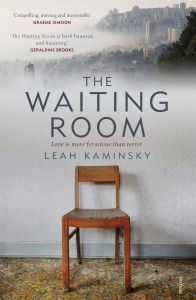From My Bookshelf: Leah Kaminsky’s THE WAITING ROOM
 I was all set to wait patiently for the U.S. release of Leah Kaminsky‘s debut novel The Waiting Room (which will happen next fall). But then, the author—an Australian whom I’ve yet to meet in person but with whom I’ve developed another of those wonderful “online friendships” I’m so grateful for—sent me a gift copy of the original Australian edition, which was published this past September. And how pleased I am that she did.
I was all set to wait patiently for the U.S. release of Leah Kaminsky‘s debut novel The Waiting Room (which will happen next fall). But then, the author—an Australian whom I’ve yet to meet in person but with whom I’ve developed another of those wonderful “online friendships” I’m so grateful for—sent me a gift copy of the original Australian edition, which was published this past September. And how pleased I am that she did.
There’s so much that’s noteworthy about this book, beginning with the subject matter. What I realized only a few pages in is that The Waiting Room brings together two topics that are often categorized separately among Diaspora readers. First, there’s its Holocaust thread. Protagonist Dina Ronen, Australian-born, is the daughter of two Holocaust survivors. Her father died during Dina’s childhood; her mother has passed away by the time the novel opens, with Dina a married mother of one young son and another baby about a month away from delivery. But her mother’s ghost speaks throughout the book, and we return often to her parents’ histories in flashbacks.
Second, this is a novel that is set in Israel, in Haifa, where adult Dina has built a life with her sabra husband and pursues her work as a physician. The book’s narrative present unfolds over a single morning in May 2001; a brief prologue and epilogue aside, the central action takes place in the hours leading up to and in the immediate aftermath of an horrific terrorist attack that has taken many lives. As with her childhood, Dina’s life in Israel prior to that life-changing morning is depicted clearly and powerfully.
Others have written far more thoughtful, in-depth reviews of the book than I can manage at the moment here. Perhaps my favorite discovered thus far is one by Alice Nelson for the Sydney Review of Books. Nelson does a magnificent job considering The Waiting Room on its own merits, but also situates it alongside Kaminsky’s other published work (notably, her 2010 poetry collection Stitching Things Together) as well as in relation to works by Australian, Israeli, and other writers. I urge you to read it; if I haven’t already induced you to add The Waiting Room to your list of books to be read in 2016, Nelson’s piece surely will.